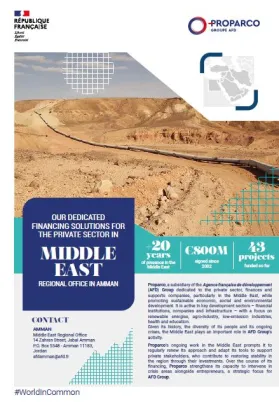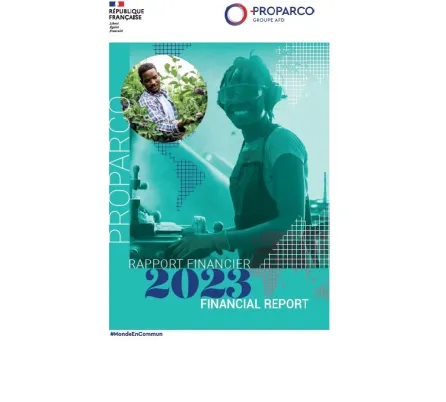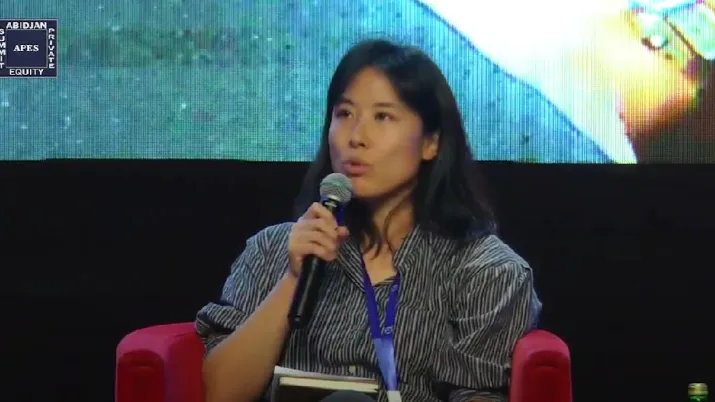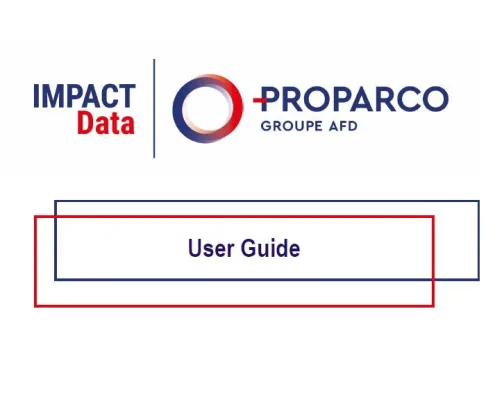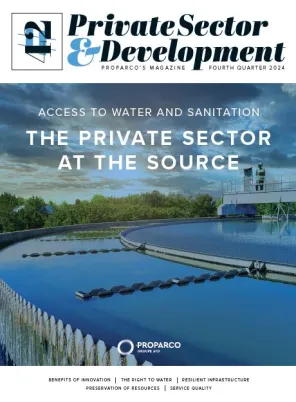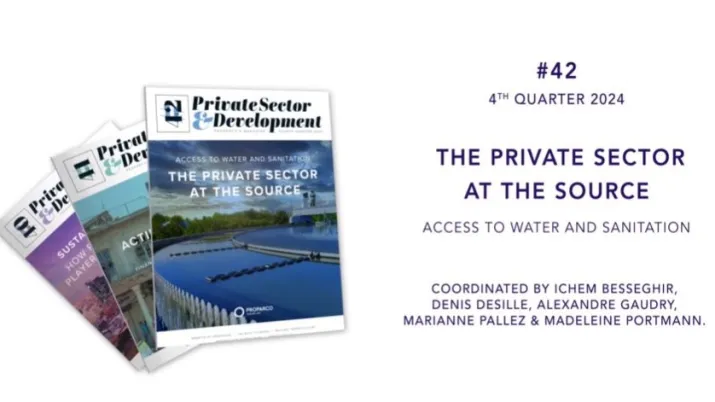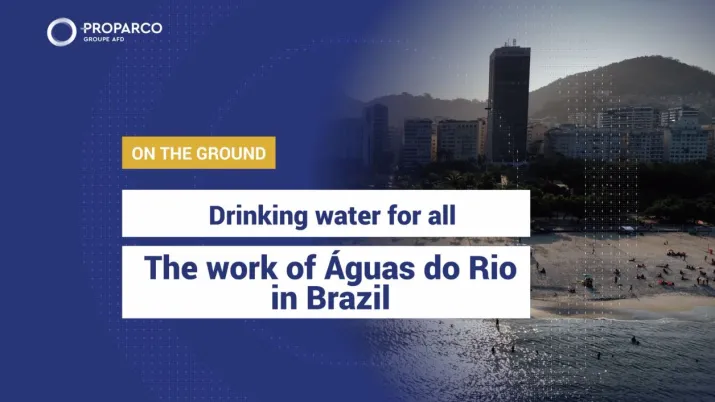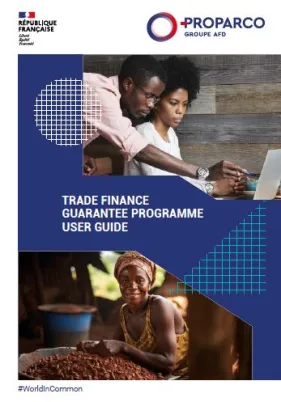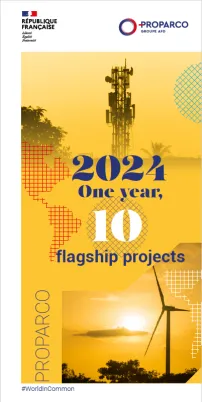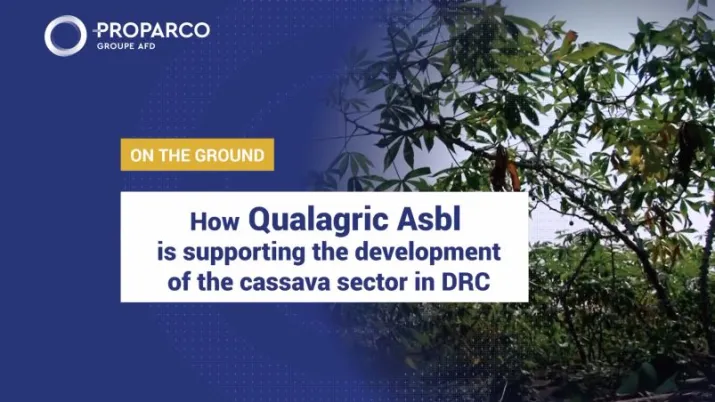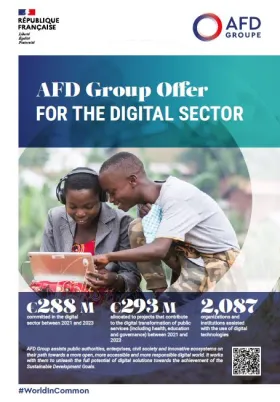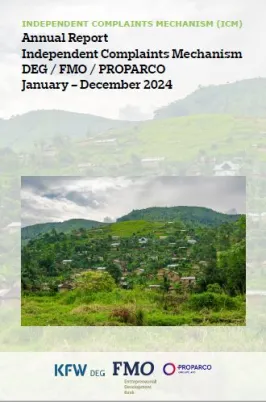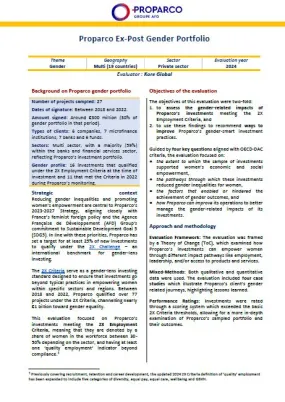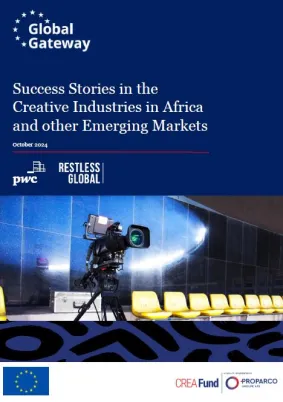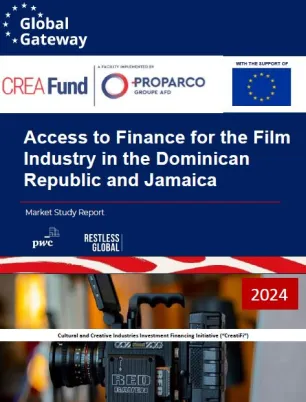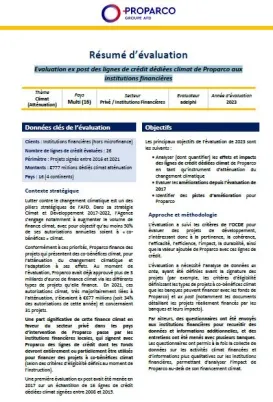Search results
Our dedicated financing solutions for the private sector in Middle East
Given its history, the diversity of its people and its ongoing crises, the Middle East plays an important role in AFD Group's activity.
Publication
Published on
Proparco Financial Report 2023
Download Proparco's 2023 Financial Report in English and French (bilingual version).
Publication
Published on
Replay - Intervention of Proparco at The Abidjan Private Equity and Venture Capital Summit
Watch the intervention of Agnès Huang, Senior Equity Investment Officer at Proparco, during the Abidjan Private Equity and Venture Capital Summit (APES), on 25 and 26 March 2024.
Publication
Published on
Impact Data platform - User guide
As a development finance institution, Proparco is committed to promote transparency and accountability in assessing the social, economic and environmental impacts of its financing operations. With the...
Publication
Published on
Replay - Intervention of Proparco at the webinar "Invest In Guinea"
Watch the intervention of Sadio Dicko, Proparco's Regional Director for West Africa, during the webinar "Invest In Guinea", organized by Africa CEO Forum on September 18, 2024.
Publication
Published on
Private Sector & Development #42 - Access to water and sanitation: the private sector at the source
This magazine is dedicated to the role of private sector in the access to water and sanitation. A major issue at a time when more than 2.2 billion people worldwide still do not have access to safe dri...
Publication
Published on
Presentation of Private Sector & Development #42 magazine
Proparco is publishing the 42nd edition of its Private Sector & Development magazine, dedicated to the role of private sector in the access to water and sanitation. This is a major issue at a time...
Publication
Published on
Drinking water for all: the work of Águas do Rio in Brazil
As part of the programme to privatise water and sanitation services in the State of Rio, the private company Águas do Rio - supported by IDB Invest and Proparco - was awarded management of two concess...
Publication
Published on
Proparco’s Trade Finance Programme - User Guide
By securing the trade-related payment obligations of approved financial institutions in emerging markets, Proparco’s Trade Finance Programme supports growth and competitiveness of local companies.
Publication
Published on
Proparco's Top 10 Projects 2024
The “Top 10 Projects 2024” highlights the diversity and impact of funding committed within the framework of Proparco's strategic priorities for 2023–2027. By supporting the private sector, Proparco...
Publication
Published on
How Qualagric Asbl is supporting the development of the cassava sector in DRC
In 2023, Proparco provided Qualagric Asbl, a leading Congolese agri-operator, with a funding and technical assistance of EUR 400,000 to support the development of the cassava value chain in Democratic...
Publication
Published on
ACEP Sénégal: How microfinance is boosting small players in the agri-business sector
For over 30 years, ACEP Sénégal has been partnering small players in the agri-food sector by facilitating access to financial services. Its presence throughout Senegal, working alongside the rural pop...
Publication
Published on
AFD Group offer for the digital sector
AFD Group, through its entities AFD, Proparco, and Expertise France, supports public authorities, businesses, civil society, and innovative ecosystems in their digital transformation.
Publication
Published on
Annual Report Independent Complaints Mechanism - DEG/FMO/Proparco - January/December 2024
This annual report covers the activities and performance of the Independent Complaints Mechanism (ICM or Mechanism) of DEG, FMO and Proparco (the DFIs) from 1 January 2024 to 31 December 2024.
Publication
Published on
Evaluation summary - Proparco Ex-Post Gender Portfolio
2X Criteria is the global industry standard for assessing and structuring investments that ensure that practices exist within a company or financial intermediary to promote gender equality.
Publication
Published on
Evaluation summary - Étude d’impacts genre du portefeuille Microfinance Tunisie de Proparco (FR)
Réduire les inégalités de genre et promouvoir l’autonomisation des femmes sont au cœur de la stratégie 2023-2027 de Proparco. Dans ce cadre, Proparco a mené en 2024 une étude d’impact auprès de trois...
Publication
Published on
Report - Success Stories in the Creative Industries in Africa and other Emerging Markets
This report, titled "Success Stories in the Creative Industries in Africa and other Emerging Markets," analyzes the journey of 12 African creative enterprises in six countries, compared to 10 examples...
Publication
Published on
Report - Access to Finance for the Film Industry in the Dominican Republic and Jamaica
Ce rapport, intitulé "Access to Finance for the Film Industry in the Dominican Republic and Jamaica", se concentre sur l'accès au financement pour l'industrie du film en République dominicaine et en J...
Publication
Published on
Evaluation summary - Évaluation ex post des lignes de crédit dédiées climat aux institutions financières (FR)
Lutter contre le changement climatique est une priorité majeure pour le groupe AFD qui s’est engagé dans sa stratégie Climat et Développement 2017-2022 à consacrer 50% de ses financements à des projet...
Publication
Published on

